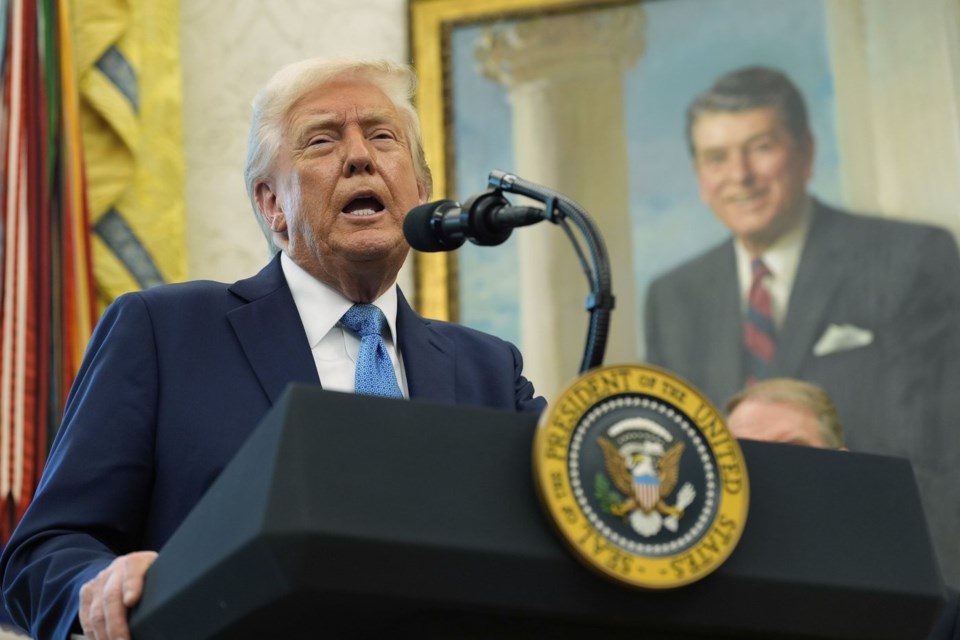WASHINGTON (AP) ‚ÄĒ Two major law firms asked separate judges Wednesday to permanently block executive orders that were meant to punish them and harm their business operations.
The firms ‚ÄĒ and ‚ÄĒ say the orders are unconstitutional assaults on the legal profession threaten their relationships with clients and retaliate against them based on their past legal representations or their association with particular attorneys whom Trump perceives as his adversaries.
Courts last month temporarily halted enforcement of key provisions of both orders, but the firms asked in court Wednesday for the edicts to be struck down in their entirety and for judges to issue rulings in their favor. Another firm, , is scheduled to make similar arguments next week and a fourth, , is set to make its case next month.
‚ÄúThe entire executive order is retaliatory,‚ÄĚ Dane Butswinkas, a lawyer who presented arguments on behalf of Perkins Coie, told a judge.
U.S. District Judge Beryl Howell did not immediately rule on the firm's request, but she repeatedly expressed deep unease over the executive order, signaling that she was inclined to side with Perkins Coie.
She grilled a Justice Department lawyer over the government's plans to suspend the security clearances of lawyers at the firm and asked him to respond to the suggestion that the blacklisting of disfavored law firms was similar to the ‚ÄúRed Scare‚ÄĚ panic over communism decades ago. And she pressed him to explain why the Trump administration was forcing firms to disavow the use of diversity, equity and inclusion considerations in their hiring practices.
‚ÄúWhy does the administration view those three words as dirty?‚ÄĚ Howell asked.
Justice Department attorney Richard Lawson disputed the idea that executive orders were meant as punishment and said the government was entitled to be concerned by what he called the ‚Äúunlawful‚ÄĚ consideration of race and gender as hiring factors by law firms.
The spate of executive orders taking aim at some of the country’s most elite and prominent law firms are part of a by Trump designed to reshape and extract concessions from powerful institutions. The actions have forced targeted entities, whether law firms or , to decide whether to push back and risk further incurring the administration’s ire or to agree to concessions in hopes of averting sanctions. Some firms have challenged the orders in court, but others have proactively reached settlements.
The executive actions have generally imposed the same sanctions against the law firms, including ordering that security clearances of attorneys be suspended, that federal contracts be terminated and that lawyers be barred from accessing federal buildings.
Judges had earlier blocked the enforcement of sections related to federal contracts and building access but not the provisions related to security clearances, a topic that dominated the Perkins Coie hearing.
In court Wednesday, Howell said she was troubled that the administration was putting the ‚Äúcart before the horse‚ÄĚ by stripping security clearances en masse without first conducting an individualized review of attorneys. She appeared to grow exasperated as Lawson struggled to answer questions about the basic mechanics for implementing the security clearance suspension or what review process would exist for the attorneys.
"You can‚Äôt tell me which agencies are conducting this review?‚ÄĚ she asked at one point.
‚ÄúYou don‚Äôt know whether the firm or the attorney whose security clearance has been suspended has been given notice about the timing of the review‚ÄĚ or whether they will have an ability to object to the review, she said.
The administration has invoked potential national security concerns in justifying the executive orders, but Butswinkas, the lawyer representing Perkins Coie, said that argument was laughable in part because the attorneys at the firm whose work was cited by the order left the firm several years ago.
‚ÄúTo me, it sounds more like national insecurity than national security,‚ÄĚ Butswinkas said.
The first law firm action took place in February when Trump suspended the security clearances of attorneys at Covington & Burling who have provided legal services to , who investigated the president between his first and second terms and secured two indictments that have since been abandoned.
The executive order targeting Perkins Coie singled out the firm's representation of Democratic presidential nominee during the 2016 presidential race, and the one against WilmerHale cited the fact that special counsel ‚ÄĒ who investigated Trump during his first term over potential ties between Russia and his 2016 campaign ‚ÄĒ was for years a partner at the firm.
“While most litigation requires discovery to unearth retaliatory motive, the President openly proclaims that he is targeting WilmerHale for representing his political opponents in election-related litigation, challenging his immigration-enforcement policies, associating with his perceived enemies (including a Special Counsel appointed by the President’s own Justice Department), and defending a client’s race-conscious college admission policies," lawyers for WilmerHale wrote in a court filing ahead of Wednesday's arguments.
In a statement after the hearing, a WilmerHale spokesperson said the firm had "fiercely defended the foundational constitutional rights to counsel and free speech, building on the successful arguments that prevented the unlawful Executive Order from taking effect. We remain confident the court will permanently block the order.‚ÄĚ
Last month, Paul Weiss cut a deal with the Trump administration that resulted in an executive order against it being rescinded.
Since then, have reached agreements with the White House that require them, among other things, to dedicate free legal services to causes the Trump administration says it champions.
They include Skadden, Arps, Slate, Meagher & Flom; Milbank; Willkie, Farr & Gallagher; Kirkland & Ellis; Latham & Watkins LLP; Allen Overy Shearman Sterling US LLP; Simpson Thacher & Bartlett LLP; and Cadwalader, Taft & Wickersham.
Eric Tucker, The Associated Press




